Africa, prey for the great powers
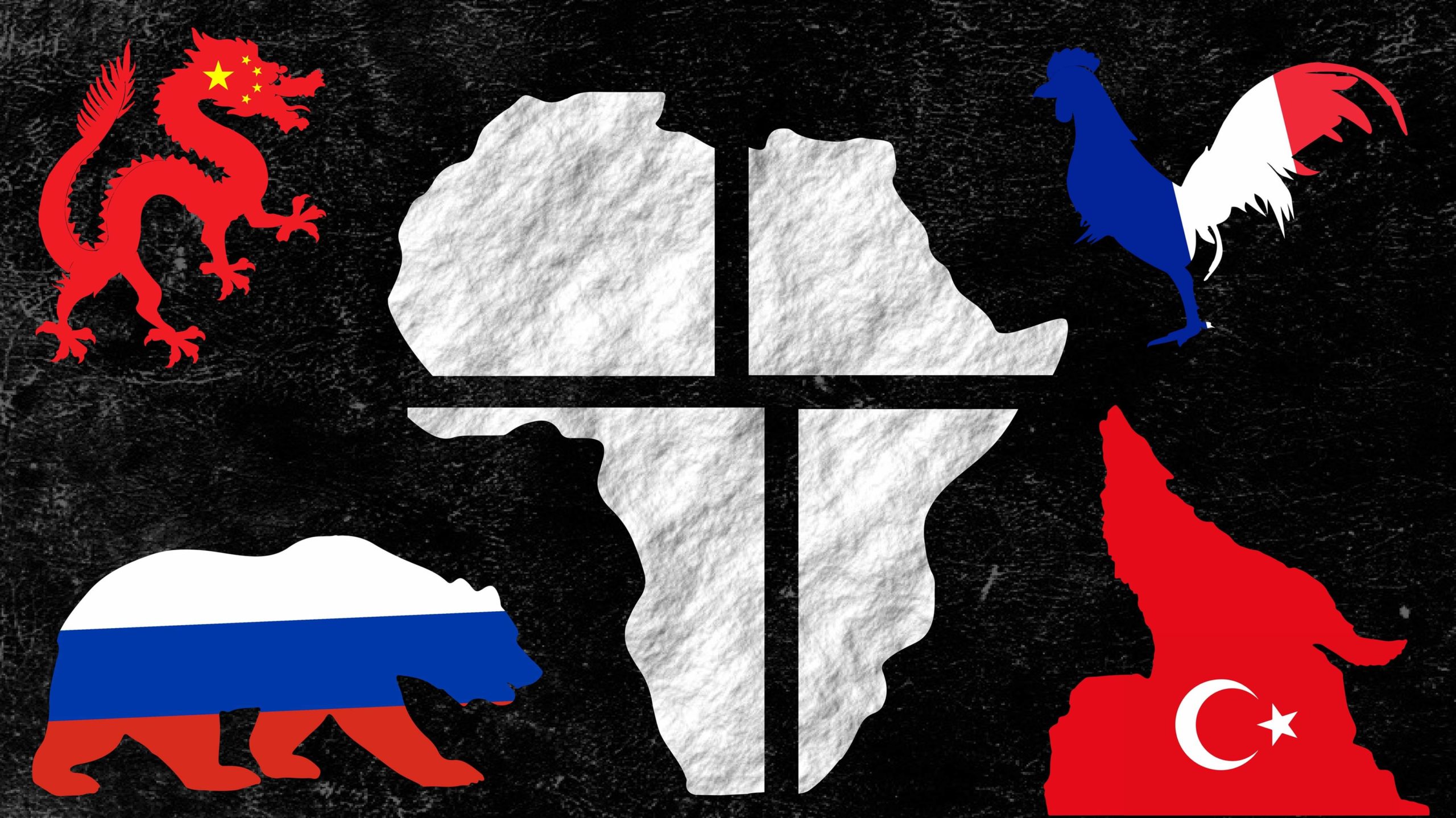
France in Africa, the remnants of Françafrique?
France has a rich history with Africa, beginning in 1830 with the conquest of Algiers, which until then had been under Turkish rule. This was followed by the French colonial era in the Maghreb, excluding Libya, and in the Sahel. These countries all gained peaceful independence in 1960, with the exception of Algeria in 1962, drastically distancing Paris from its former colonies. However, France has not completely severed its ties, particularly economic ones: the CFA franc, a vestige of this era, only began to disappear last year, in 2020.
Today, France is present diplomatically in 47 African countries, and militarily with over 8,000 troops on the continent. Trade between France and Africa amounts to some $54 billion.
France, present through four permanent bases on the continent
- The French Forces in Djibouti (FFDj): a group of 1,450 soldiers commanded by Air Force Major General Eric Gernez. Their presence was formalized by a cooperation agreement at the end of 2011. This base offers access to the Indian Ocean and the Red Sea. France enjoys good relations with this country, whose President made an official visit to Paris on February 12.
The French Forces in Côte d’Ivoire (FFCI): a group of 900 soldiers whose base was built in 2015 following a vote by the Ivorian National Assembly, in 2014, as we can read on the website of the Ministry of the Armed Forces:
“By virtue of their geographical positioning, the quality of their port and airport infrastructures and the capacities of their rights-of-way, the FFCI constitute a major strategic, operational and logistical platform on the West African facade.”
The French Elements in Gabon (EFG): a group of 370 soldiers, about which the Ministry also tells us that:
“The main mission of the EFG is that of an operational military partnership. Regional cooperation actions are aimed more specifically at supporting African states in strengthening their collective security capabilities to contribute to regional stability.”
- The French Elements in Senegal (EFS): a group of 400 soldiers, already present since 2011 following a treaty between the two countries. Contributing to the global approach to securing the African continent, the EFS have carried out training missions for national armies, 25% of them in Senegal, as well as in twelve other West African countries, according to the Ministry.
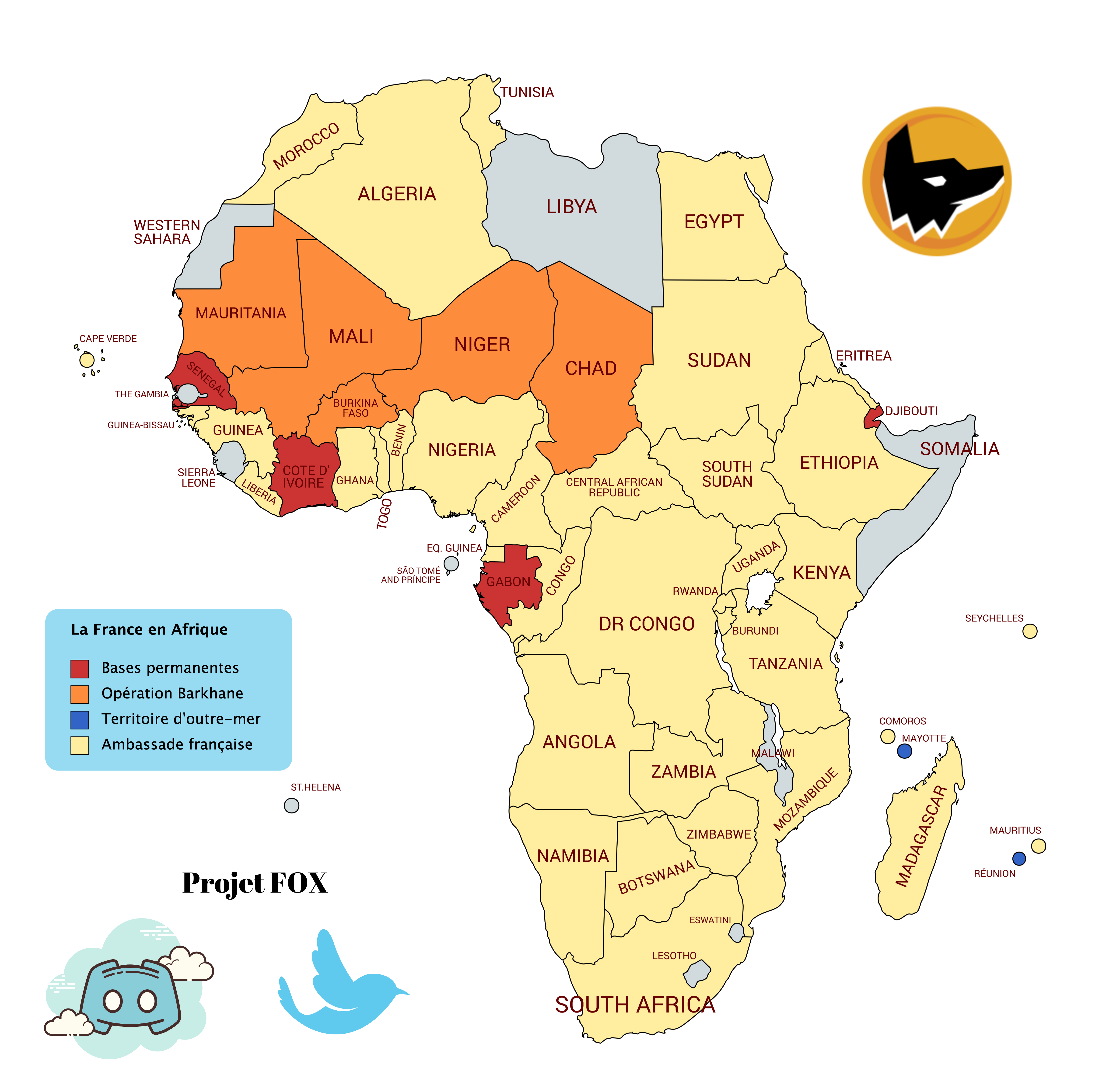
Operation Barkhane: a reminder of the French presence by force
Operation Barkhane is a military operation launched on August 1, 2014 and led in the Sahel by the French army. This zone encompasses 5 countries: Mauritania, Mali, Burkina Faso, Niger and Chad. French diplomacy affirms that the aim of this operation is to enable partner states to acquire the capacity to ensure their security autonomously.
To date, 5,100 French soldiers have been deployed. Other countries are also supporting the operation to a lesser extent: the UK, Estonia, Denmark and the Czech Republic, for example, have each deployed between 60 and 100 soldiers. The United States, meanwhile, is providing logistical support and is actively involved in intelligence, notably through the dispatch of drones. So, although France is able to provide the foundations for Operation Barkhane, it is forced to depend in part on its Western partners, and to a lesser extent reveals a weakening of its autonomy of intervention.
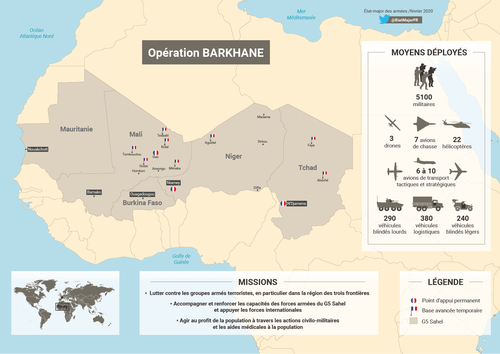
The Organisation Internationale de la Francophonie, a major Soft Power tool
France is also asserting itself in Africa thanks to the soft power of the OIF, the Organisation Internationale de la Francophonie (commonly known as La Francophonie). According to its members, this organization aims to promote the French language, cultural and linguistic diversity, as well as peace, democracy and human rights, and to support education, research and the development of cooperation.
Indeed, 54.7% of the world’s daily French speakers are in Africa, representing 116 million Africans. The organization also has two regional offices, one in Libreville (Gabon) and one in Lomé (Togo). Between 2010 and 2013, the OIF’s average annual budget was 85 million euros, which undoubtedly contributed to the conclusion of numerous deals between French and African partners.
A French-African policy handicapped by post-colonial sentiment
However, other foreign powers do not hesitate to attack France’s various tools of influence in Africa. The term Françafrique, for example, is often used pejoratively to point the finger at France’s colonial past on the continent.
Recently, on November 20, 2020, Emmanuel Macron accused Turkey and Russia, for example, of “playing on post-colonial resentment” in Africa in order to pursue a counter-influence strategy against France. What’s in it for them? Turkey and Russia also have their own interests to defend in this part of the world.
Turkey in Africa, the post-Ottoman comeback
Turkey’s past presence in Africa is less well known and older than that of Western countries. It was nevertheless limited to the Mediterranean and Red Sea coasts. This history began very early, in 1517, with the conquest of Egypt by Sultan Selim I. It reached its peak in 1683, then declined from the 19th century onwards. In 1830, Egypt gained independence and Algiers was conquered by the French. This four-century interlude finally came to an end in 1911 when Italy stole Libya from the Ottomans.
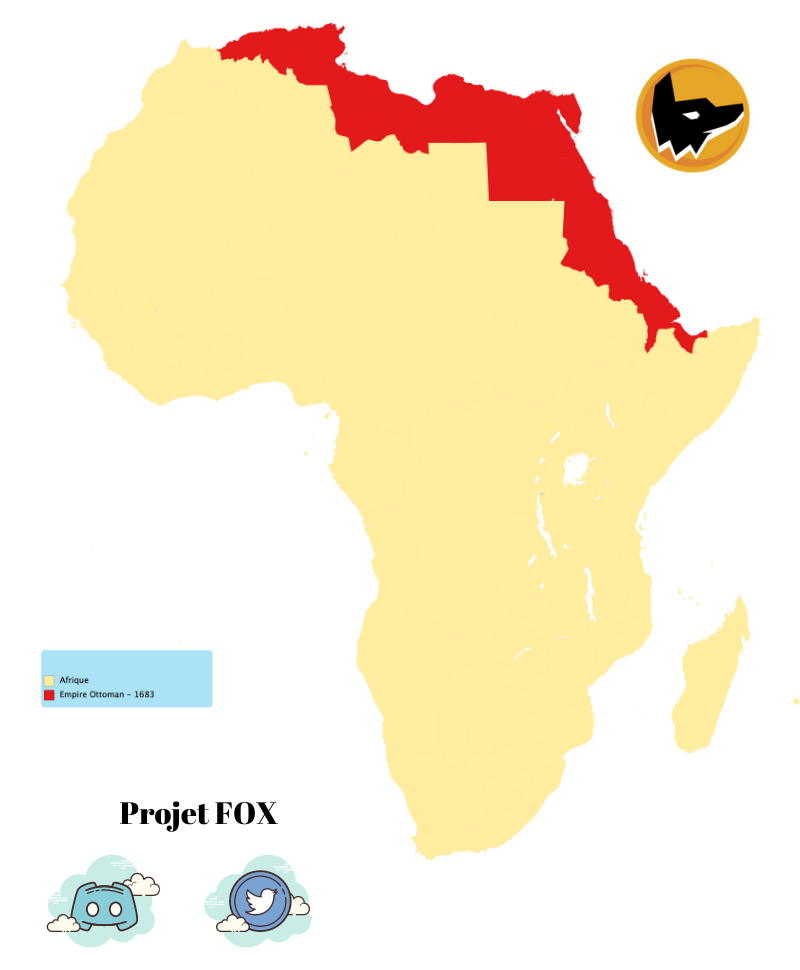
Soft & Hard power
From 12 embassies before the AKP, the party of Turkish President Recep Tayyip Erdogan, to 47 by 2020, Turkey has developed one of the largest diplomatic networks in Africa. It has practiced humanitarian diplomacy, providing aid to many African countries via its NGOs. As the world’s leading flour exporter, Turkey takes advantage of its agricultural power to carry out its projects. Although its trade links are limited compared with those of its competitors, they are growing rapidly. Turkish exports are worth $16 billion. Turkish Airlines serves 60 destinations on the continent today, up from 4 in 2008 – more than any other country in the world.
Turkey works on its image among the Muslim populations of the Maghreb countries through television series, making Ankara the world’s second-largest exporter of series behind the United States. The country plays an active role in restoring mosques and developing education and culture on the continent.
Somalia
Somalia is the spearhead of Turkey’s strategy in Africa. It is home to a Turkish military base where 200 soldiers, including trainers, are on hand to train around 10,000 Somali soldiers. The country offers direct access to the Arabian Sea and the Indian Ocean. Like Yemen, it controls the gateway from the Gulf of Aden to the Red Sea.
Bilateral trade rose from $183 million to $250 million between 2018 and 2019. Turkish investment in Somalia has exceeded $100 million. On November 4, 2020, Turkey even discharged the remainder of Somalia’s debt to the IMF.
Libya
Turkey’s strategy in Libya is more complex. The country, in the throes of civil war, is split in two. To the west, in Tripolitania, is the UN-recognized Government of National Unity (GNA) led by Fayez el-Sarraj. To the east, in Cyrenaica, the Libyan National Army (LNA) led by Marshal Haftar. ANL troops had laid siege to Tripoli prior to the Turkish intervention. This intervention follows a double defense and maritime delimitation agreement between the two countries on November 27, 2019.
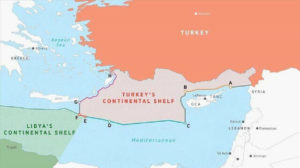
Following the Turkish parliament’s authorization to send troops. Turkey became openly involved militarily in support of the GNA. Thanks to this support, the GNA pushed back the ANL. The front line is now fixed around the city of Sirte.
The agreement on maritime zones and the Turkish intervention have provoked diplomatic tensions, notably between France and Turkey. The Quai d’Orsay is leaning in favor of General Haftar’s ANL, which is backed by Egypt, the United Arab Emirates and above all Russia. Vladimir Putin’s country, like Turkey, has deployed its mercenaries on Libyan soil. The GNA government, meanwhile, is backed by Turkey and Qatar, and seems to be favored by Italy.
On October 2, 2020, the UN finally certified the maritime delimitation agreement between Turkey and Libya.
Coming soon: a more detailed article on the Libyan dossier by Projet FOX
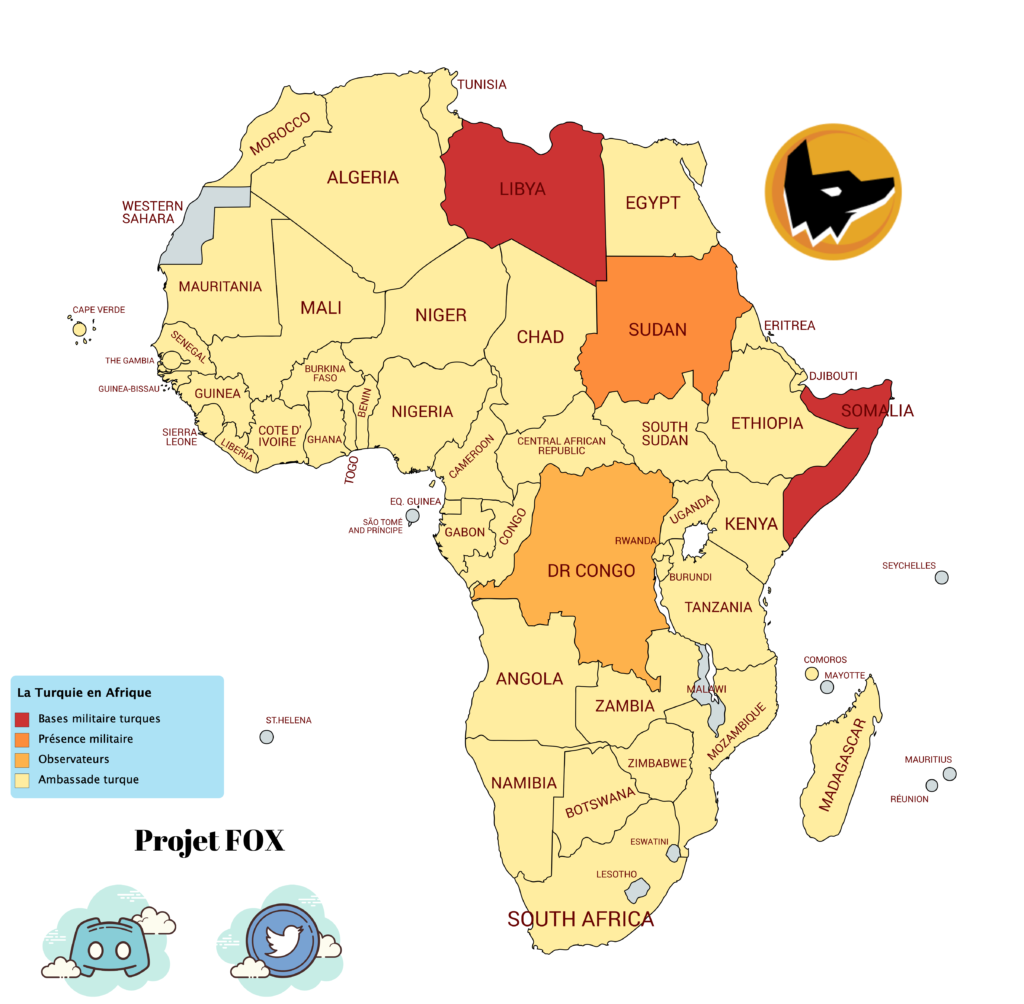
Russia enters the African race
The USSR already had links with certain African countries, thanks to an ideology in opposition to that of Western countries in the post-colonial period. With the collapse of the Union, Russia was unable to preserve these ties. For a long time, it lost interest in the African continent. However, since 2016 and thanks to an African tour by Foreign Minister Sergei Lavrov, we are seeing a turning point in Russian policy in Africa.
Russia has 40 embassies on the continent. More than 20 military cooperation agreements have been signed since 2017. There is no longer any doubt that Russia is investing massively in Africa and in all sectors. Its presence competes aggressively with France, and Russian business networks are there to influence opinion. Russia insists on the absence of a colonial past and on the Soviet Union’s support for the independence of African countries.
Trade between Africa and Russia is currently estimated at $22 billion, but this figure needs to be qualified, as Egypt alone already accounts for $7.7 billion.
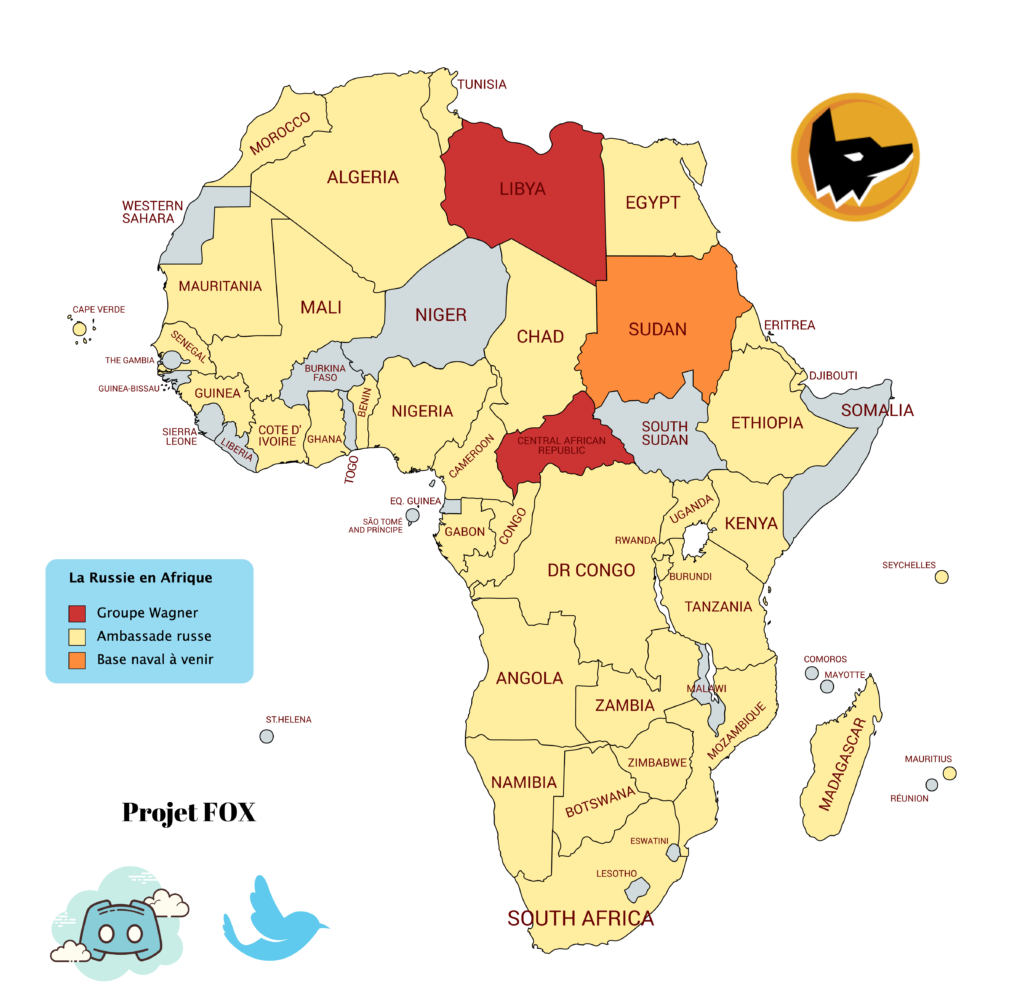
Russian weapons, the lifeblood of the African war
Russia is the leading arms dealer on the continent, with around half the market share. Its competitors, China and the USA, account for approximately 13%.
Algeria alone accounts for over 50% of Russian arms sales on the continent. Russia has succeeded in gaining a virtual monopoly of the Algerian market. This strategy began with the total write-off of a $4.7 billion Algerian debt in 2006. That same year, the two countries signed an arms deal worth over $7.5 billion, including the delivery of Russian combat aircraft.
Egypt is the second largest importer of Russian weapons, accounting for 33% of sales.
As mentioned in the paragraph on Turkey in Libya, Vladimir Putin’s motherland isn’t just selling arms in Africa. It also deploys mercenaries from the Wagner Group to fight alongside the ANL. However, since 2018, the private company has also been deployed in the Central African Republic due to the government’s inability to control its entire territory since the departure of French troops at the end of 2016. Since 2014, a UN peacekeeping mission, MINUSCA, has been active in the Central African Republic, attempting to stabilize the situation in the main population centers and helping to re-establish state authority throughout the country.
The mercenaries are involved in training soldiers for the recently-established Central African Army and in providing personal protection for President Faustin-Archange Touadéra. However, as Projet FOX members have noted on our Discord, mercenaries are also present alongside the military in operations against rebel groups.
China, the behemoth
With 53 embassies in Africa, China has the largest diplomatic network on the continent. China is well aware that it cannot compete with the Russians in the field of armaments. Chinese policy is therefore focused on trade, through massive investment on the continent. It enjoys a reputation as a non-interventionist, non-moralizing country, inherited from its non-aligned stance during the Cold War.
In 2017, according to official Chinese figures, Chinese imports from Africa were worth $75.3 billion, compared with $94.7 billion for exports to the continent.
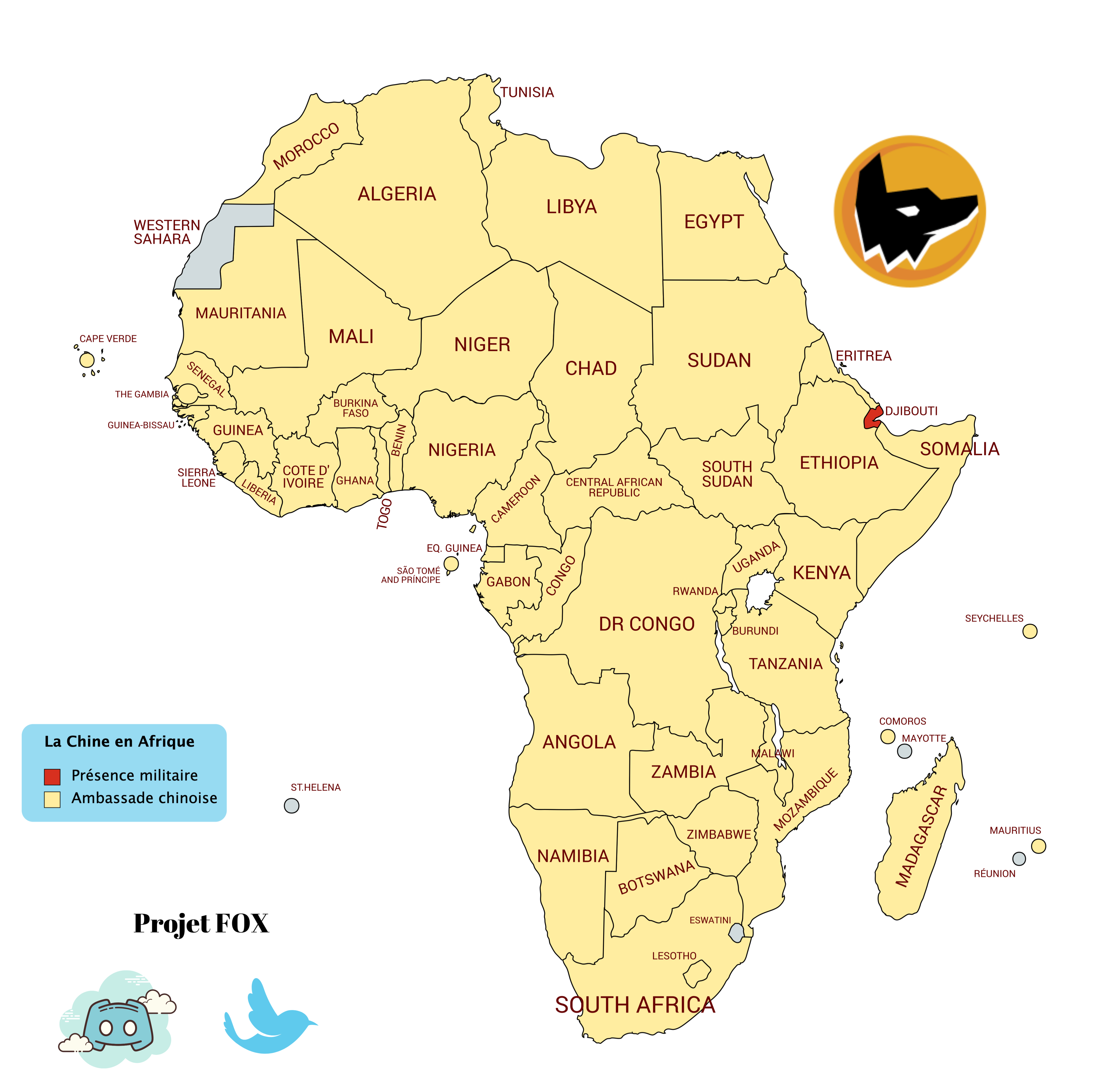
Senegal, a country generously served
Already the country’s second-largest trading partner, China is also its biggest investor. For example, it has provided $800 million in financing for a 113-kilometer highway linking the regions of Dakar, Thiès and Diourbel, in the east of the country. In 2018, it also invested nearly $50 million in a brand-new wrestling stadium in Dakar, a national sport for the Senegalese.
Djibouti, the gateway to Africa's new Silk Roads
In Djibouti, where it has set up its only military base in Africa, China has invested more than €12 billion over the past 10 years. Inaugurated in 2017, the base, located near the international port, is home to around 250 Chinese soldiers. According to some specialists, there could be 10,000 by 2026.
Following some concerns about its debt burden, China is seeking to reassure its African partners. It is not here to adopt a position of hegemony, but its African strategy is important in the context of its trade war with the United States.
This confrontation will be scrutinized by all observers in the decade to come, as the stakes will be so high between the world’s leading powers.
The Projet FOX will keep its members informed of all forthcoming developments, on Discord as much as on Twitter.